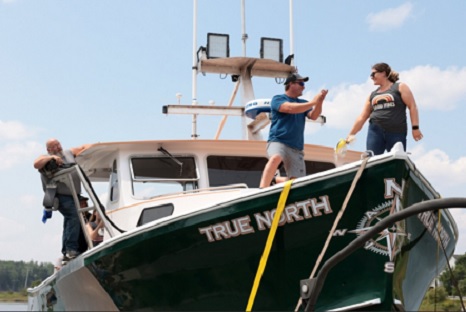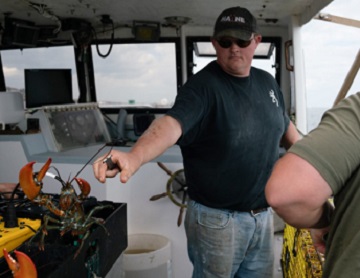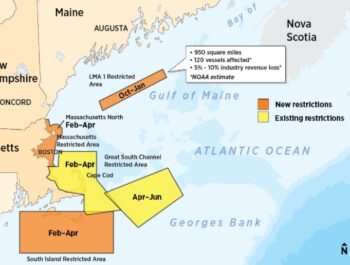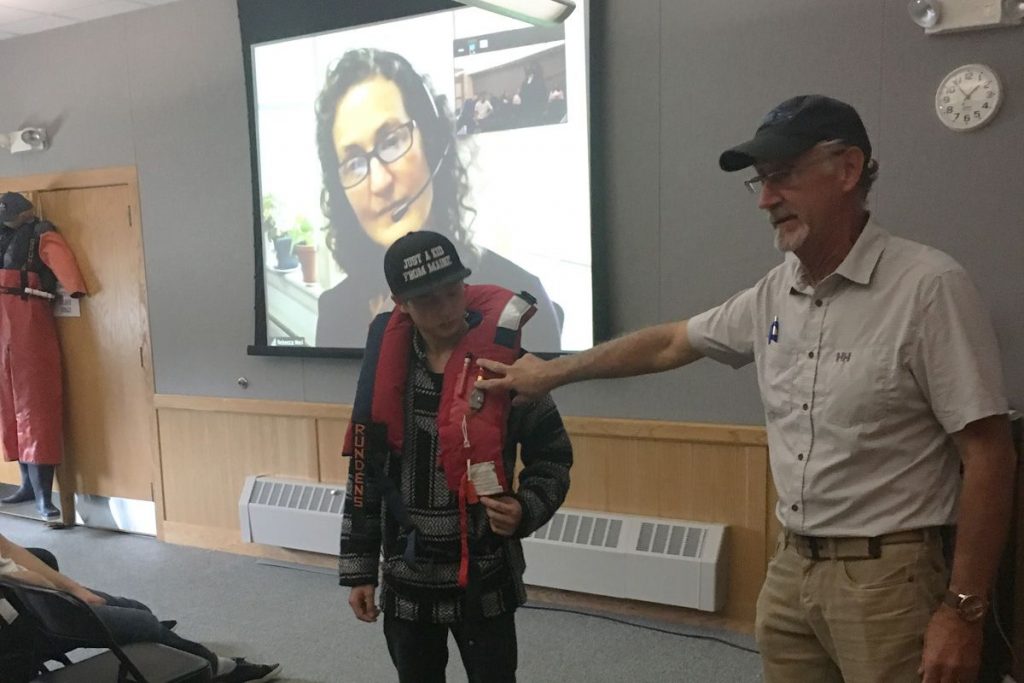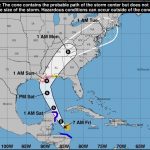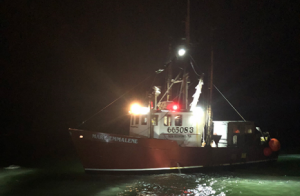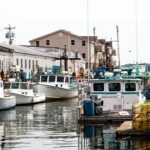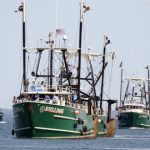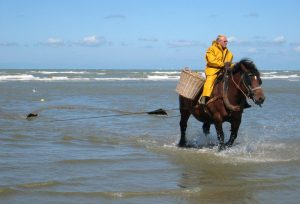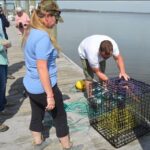Tag Archives: lobstermen

Maine lobstermen deal with another new rule, and it’s not about right whales
Until this year, only a fraction of Maine’s lobster fishers were required to report what they caught, including details on when, where and how many. The data went to the Atlantic States Marine Fisheries Commission, a coalition of 15 East Coast states that regulates fishing for more than two dozen species. But as Jan. 1, all Maine lobstermen now have to report data on their harvests to the state and to the commission. The fishermen, traditionally wary of new regulations on their industry, aren’t saying much. “All the paperwork is always a hassle, but we need to give up the data and hopefully it doesn’t get used against us,” said John Tripp, a lobsterman from Tenants Harbor. Several other members of the lobster industry declined a request for an interview about the mandate. >click to read< 09:15

Are we really going to let them kill our ocean and our fishing way of life?
Generations of fishermen are no longer fishing because of the restrictions and unfair quota from faulty science. Like I said in earlier posts, we went from 400 active boats down to 17 barely active boats. Meanwhile conservation groups will tell you that we are wiping the ocean out from overfishing. That is so wrong on so many levels, it isn’t even funny. Hard to believe New England was considered to be sustainable for haddock and lobsters. Then fishing efforts went down and now we are no longer sustainable. The only thing that’s changed is windmills are on their way to the Gulf of Maine and the management at NOAA and NMFS are allowing it to happen. Why would they not talk to the people who have committed their lives to the job of harvesting our ocean?! Well, I can’t speak for everyone, but I have a few hypotheses. By Jerry Leeman. >click to read< 16:38
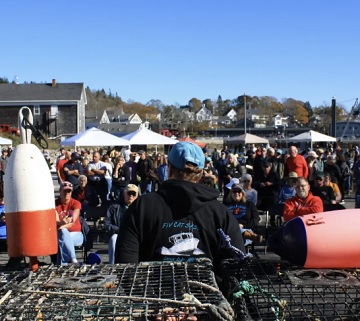
Fishermen and politicians pledge to battle for Maine’s lobster industry in Stonington
More than 200 lobstermen and supporters amassed in the state’s most valuable fishing port Sunday to say they will continue to fight any attempts to put new regulations on the industry. Marine Resources Commissioner Patrick Keliher, one of more than 20 speakers at the rally, said regulators need to get better data on whale migration patterns in the Gulf of Maine. Julie Eaton of Deer Isle, who fishes out of Stonington, said fishermen have repeatedly sacrificed for years, changing their gear to accommodate new regulations. >click to read< 08:31
‘90% reduction decimates this whole town’: Lobsterman’s rally held in Stonington – “If you’re not here fighting for this, there might not be another day,” said Richard Larrabee Jr. “A 90% reduction decimates this whole town, our children ‘s futures. If my son wants to go fishing, he doesn’t have that option.” Video, >click to read<
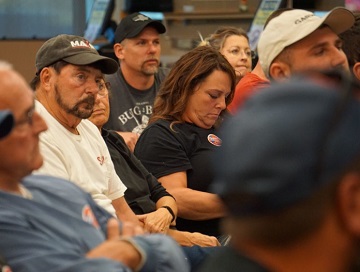
Fishermen reeling as further whale protection measures fast tracked
Maine lobstermen worry that their fate is sealed. Dozens gathered Tuesday evening in the Ellsworth Elementary-Middle School cafeteria for a livestream of a NOAA Fisheries scoping session on modifications to the Atlantic Large Whale Take Reduction Plan. Hundreds more participated online. Spurred by a recent court ruling, federal regulators are fast tracking plans to achieve a 90 percent reduction in entanglement risk. “These are measures that are going to really hurt and there were measures that were put forth that look really bad that didn’t come close to 90 percent, so I want people to realize that this is real, that this is coming and it’s not going to be pretty,” said Kristan Porter, president of the Maine Lobstermen’s Association and an Atlantic Large Whale Take Reduction Team member. >click to read< 10:15
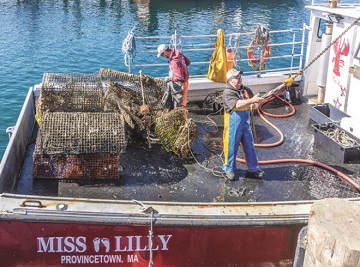
Lobstermen Don’t Deserve Monterey Bay Rating
This past February Monterey Bay hinted it might consider red listing Northeast lobster, not because the fishery isn’t healthy but because of the danger of entanglement in lobster trap lines for the highly endangered North Atlantic right whales. The announcement, which became official on Sept. 6, has spurred an intense campaign to reverse this classification. Some of the data suggest this recommendation might be an overreaction. Another thing missing from this story is how much our fishermen are doing to avoid entanglements: removing “ghost gear,” doing 10 m.p.h. in the bay, and, most significantly, holding back until May, which keeps their gear out of the water when the whales are here. >click to read< 08:36
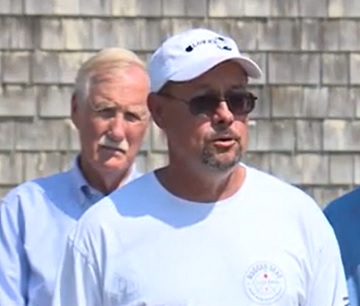
Maine lobstermen, politicians rally in protest of fishing restrictions and Seafood Watch’s recommended boycott
At a rally in Portland’s Old Port on Friday, they protested a federal judge’s ruling issue Thursday allowing the National Marine Fisheries Service, a branch of the National Oceanic and Atmospheric Association to impose limits on where and how lobstermen fish in order to protect endangered North Atlantic Right Whales. The rally was also protesting Seafood Watch, a California-based sustainable seafood advocacy group affiliated with the Monterey Bay Aquarium, now recommending food distributors and restaurants boycott Maine lobster in the name of saving the whales. Video, >click to read< 09:55
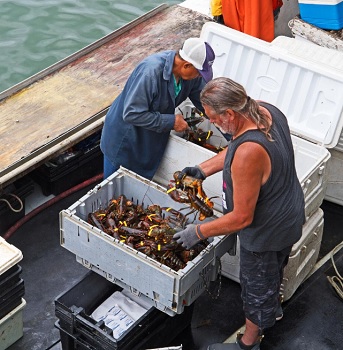
Massachusetts lobstermen back in water facing new challenges
Lobstermen in Massachusetts are back in the water and facing a variety of challenges. Fishermen were grounded due to right whale protections. The battle now is a combination of high fuel costs and lower prices at fisheries, raising the cost of fishing operations. “If the fuel price doesn’t get lower and the price of lobster doesn’t get into a stable – I’m not even going to say high price but a stable price – things are going to be tough,” >click to read< 21:10
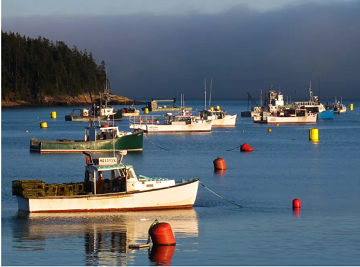
Down East seafood harvesters struggle to access health care, according to survey
Unless she needs to be stitched up, Deer Isle lobsterman Julie Eaton probably isn’t going to the hospital. She’d have to dock her boat in Stonington and drive up to the hospital in Blue Hill, nearly a 45-minute ride away. Not only will she lose out on a fishing day, but when she does get there, it’ll probably cost an arm and a leg, because Eaton, like many lobstermen, doesn’t have insurance. “Health care is a challenge,” she said. “I don’t have insurance. I don’t go unless I’m bleeding.” It’s a common refrain in the industry and one backed up by the results of a recent survey of more than 100 Down East lobstermen and shellfish harvesters. >click to read< 21:43
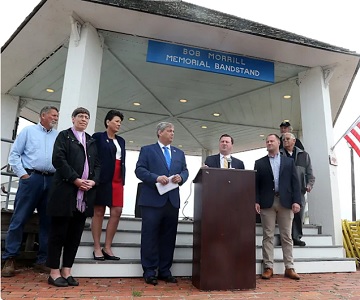
Massachusetts: Lawmakers want to pay lobstermen during right whale conservation closure
State senators next week will debate a plan by South Shore lawmakers to pay lobstermen during a months-long annual fishing closure advocates say cuts income of some fishermen by as much as half each year. State senators Patrick O’Connor and Bruce Tarr have filed a budget amendment that would allocate $12 million to pay lobstermen $1 per week per trap they are licensed for during time they are not allowed to fish. The state annually shuts down more than 9,000 square miles of water for at least three months in efforts to protect migrating right whales. > click to read < 08:28
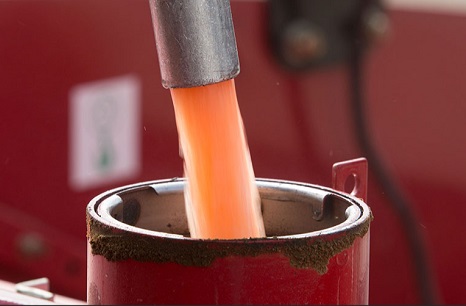
Commercial fishermen dealing with off the chart fuel prices
The fuel prices are also affecting prices out at sea. Many commercial fishermen use diesel, which is now running well over 6 dollars a gallon. Captain James Keding has been running Mary K, named after his mother, for 38 years. He says his mussel harvesting operation is taking a huge hit from fuel prices. “Back in 2019, I paid $1.50 a gallon, now I’m paying $6.50 a gallon,” said Keding. Lobstermen are also in a pinch. Captain Dave Hobson says the Right Whale restrictions were just lifted so everyone in his line of work is trying to run their traps out with the higher fuel costs. >click to read< 07:53 Video, Rising diesel prices having big impact on commercial fishermen, >click to watch<

Need for legal defense fund spotlights failures of federal lobster management
The Legislature’s recent passage of LD 1916, An Act to Create a Legal Defense Fund for the Maine Lobster Industry, shows a clear move by the state to protect its lobstermen from assumed federal government oversight. LD 1916, sponsored by Rep. Billy Bob Faulkingham, R-Winter Harbor, allocates money from an existing lobster license surcharge to help fund the legal battle against these tough regulations in the courtroom. Lobstermen have argued that the regulations aimed at protecting right whales are unfounded and not science-based. Some have argued that a right whale has not been found in the waters that have been closed off by NOAA since 2010. >click to read< 10:46
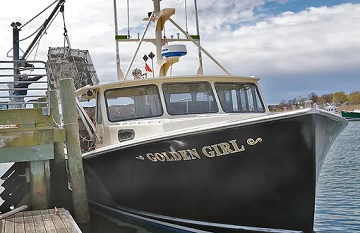
Massachusetts state lobster closure extended
As has become an annual tradition, the state’s yearly fishing closure to protect right whales has been extended until mid-May, cutting short a season already slashed in the name of species protection. The state sent out a notice to lobstermen Friday that the closure for 9,000 square miles of water, tentatively set to end May 1, would be extended through May 15 due to the presence of whales off the coast and near the Cape. For now, Massachusetts lobstermen are restricted to fishing in federal waters, where the season started at midnight Sunday, May 1. >click to read< 11:12
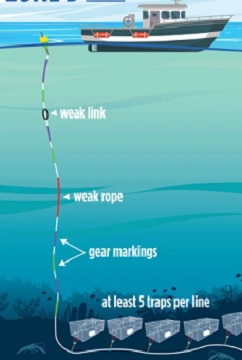
Big Story: Lobstermen fear disaster as new gear regulations take effect
Doug McLennan isn’t worried about the state of the fishery. What worries McLennan and thousands of other Maine lobstermen is the latest round of federal regulations designed to protect the endangered North Atlantic right whale, and additional measures being planned for the next decade. The newest regulations took effect Sunday, though their enforcement has been delayed until supply chain issues for some of the required gear are resolved. This is just the latest in gear regulation change required by the Atlantic Large Whale Take Reduction Plan,,, Many lobstermen have raised concerns about safety and the potential for gear failure and loss of expensive traps under the new rules, and they worry about what is coming next. >click to read< 09:16
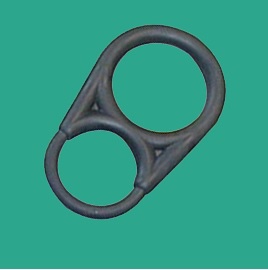
Dealers scramble to supply lobstermen ahead of gear-change deadline
May 1 is the deadline for commercial lobstermen in Maine to trawl up, use weaker rope or insert weak links, and mark gear with the state color purple. But will they be ready? “Everyone’s hoping for a good year, hoping for a good price,” said Virginia Olsen, a Maine Lobstering Union Local 207 member who fishes out of Stonington. “We’re just going to do what we do. We’re gonna go to work.” But first, enough rope and weak links must come into local fishing gear stores to supply the approximately 4,500 commercial lobstermen in Maine, each of whom can haul up to 800 traps. >click to read< 13:26
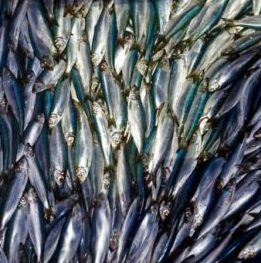
Bait Crisis: Lobstermen worry fishery closures will create bait supply issues
Last week, Fisheries and Oceans Canada shut down commercial harvesting of herring in the Gulf of St. Lawrence and Atlantic mackerel in Atlantic Canada and Quebec amid dwindling stocks. The two species are important sources of bait for the lobster industry. Some Island fishermen say they were caught off guard by the announcement as they prepare for setting day about a month from now. “It’s tough on fishermen because … we need the bait to fish lobster,” said Mallory Harris, who fishes in North Lake. Other fishermen said they’re already seeing the price of bait for lobster traps increase. >click to read< 08:14
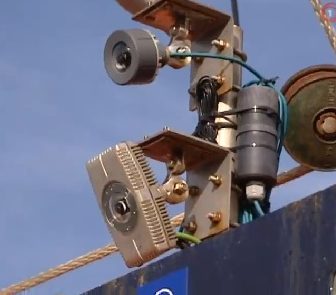
Lobstermen who harvest federal waters will be required to install electronic trackers
East Coast lobster and Jonah Crab fishermen who harvest federal waters will be required to install electronic trackers on their boats, giving federal regulators unprecedented detail on where fishing activity is taking place. A vote by the regional American Lobster Management Board approved the measure Thursday. Ware and the co-chair of the Maine Legislature’s Marine Resources Committee, Democratic Senator David Mirament, voted for the measure, over objections from the third member of Maine’s delegation, lobsterman Steve Train. >click to read< 09:32
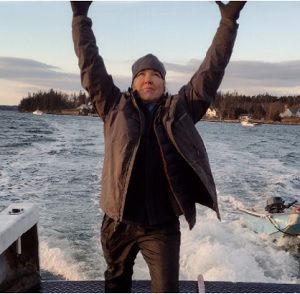
Maine seafood harvesters are taking on an unexpected new hobby
Lobstermen repeatedly haul unwieldy traps, oyster farmers bend over to pull up hulking cages and scallopers hunch over to shuck their prized shellfish at sea. Harvesting seafood for a living can exact a stiff toll on the lower back. The industry has long had a reputation for a “rub some dirt on it” mentality when it comes to these and other daily aches and pains, but a new program aims to introduce fishermen to yoga to keep them on their feet and out on the water. >click to read< 12:26
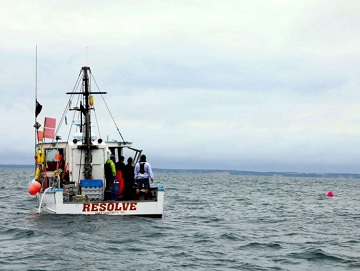
Despite threats from fellow fishermen, Mass lobstermen press to allow ropeless fishing in closed areas
The lobstermen viewed themselves as trailblazers, even calling themselves “Pioneers for a Thoughtful Coexistence”. In an effort to prove that there’s a way for their industry to resume fishing in coastal waters where Massachusetts banned lobstering to protect endangered whales, they have asked regulators to allow them to set their traps without vertical buoy lines. “I’ve been trying my best to get our guy’s back fishing,” said Michael Lane, 46, a lobsterman who fishes 800 traps out of Cohasset. But when Lane’s group presented at a recent public hearing their proposal to fish with experimental rope less gear, which would use remotely triggered inflatable balloons or other devices to surface the traps, they were pilloried by their fellow fishermen. >click to read< 19:20
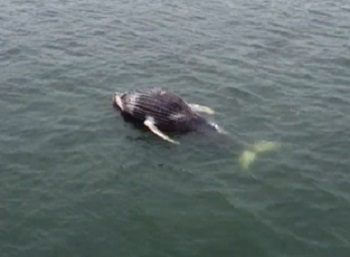
COVID-19 saves right whales by sinking cruise ships
Canada created the Shediac ship restricted zone in April 2020 just a couple weeks before Holland America’s Zaandam was scheduled to sail through that zone on a shipping lane used only seasonally by cruise ships as a shortcut to Quebec City. However, a COVID-19 no-sail order in March 2020 superseded that restriction. Consequently, there was not one Canadian ship right whale strike death in two years and only one Canadian crab entanglement death,,, Zero whales were killed by lobster gear. There has not been one death from lobster gear in the U.S. and only a couple in Canada in over 20 years but the Center for Biological Diversity, with no supporting data, claims the whales are going extinct based on lobster entanglements. >click to read< By Jim O’Connell 07:31

Maine: Lobstermen could soon face another new gear regulation
Patrick Keliher, Commissioner of the state’s Department of Marine Resources, says recent research shows that the number of juvenile lobster floating in the water column or settling to the bottom is declining for a third year in a row. Now Keliher says that lobstermen should also consider another new rule to create a “trigger” mechanism for reducing the catch of juvenile lobster when their abundance falls below a certain level. Patrice McCarron, executive director of the Maine Lobstermen’s Association, on Tuesday told members of the Atlantic States Marine Fisheries Commission that fishermen will be “in shock” when they learn about the potential new rule. >click to read< 07:01

Supreme Court denies lobstermen’s bid to halt Gulf of Maine fishing restrictions
The Supreme Court on Friday denied a request by lobster fishers to halt environmental protections that restrict fishing in a large swath of the Gulf of Maine. The application, filed earlier this week by a lobster fishers’ union and two lobster fishing companies, was rejected without comment by Justice Stephen Breyer, who handles emergency matters arising from the region. >click to read< 13:13

Lobstermen ask Supreme Court to halt restrictions meant to protect whales
The protections in question restrict the use of lobster traps in nearly 1,000 square miles in the Gulf of Maine between October and January. They are intended to protect the North Atlantic right whale,,, In the emergency application, the union and fishing companies said the restrictions would curtail fishing by more than 100 of the state’s “largest and most productive” boats, many of which only fish in the restricted area. “These fishermen and their communities have no other means to make a living except by fishing in these waters during this specific time of year, and even the loss of one season will see their vessels repossessed and their gear obsolete due to changing regulations with no funds to update them,” the application states. >click to read< 13:16 Lobstering union petitions U.S. Supreme Court to overturn Gulf of Maine closure – The Maine Lobstering Union has filed a petition asking to plead its case before the U.S. Supreme Court in an effort to reopen the area, which is slated to be closed through January – and every subsequent October through January – in an effort to protect the critically endangered North Atlantic right whale. >click to read< 17:20
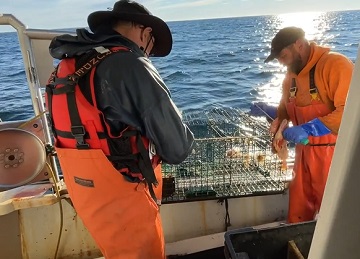
Maine Lobstering: A Family Business Facing Challenges
“Today, we really face multiple challenges including competition for the bottom fishing ground with plans to erect windmill generators, to huge increases in the price of bait due to limiting the Herring catches. Just getting new buoys made is tough,” said Capt. Steve Train, a lobsterman of Long Island, Maine. “There is a year-long wait for new traps because there aren’t a lot of people building them. And there is the closing of the federal offshore fishing grounds with the implementation of new regulations as part of the 1973 Endangered Species Act. All these challenges are driving our costs up.” West Bath, Maine Capt. Peter Doran agrees the industry has always faced challenges. photos, video >click to read< 19:04
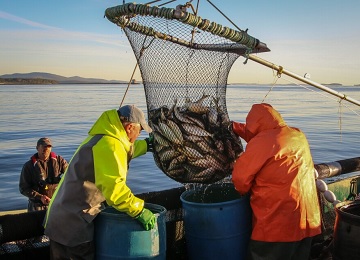
Pogies are back in Maine, and lobstermen say they’re more valuable than ever
Lobstering in Maine requires lots of bait, but Atlantic herring, a favored bait, are in short supply. Over the past few years, rebounding menhaden have been taking up the slack. Jamie Steeves, the lobster dealer who owns the boat the crew uses to catch the pogies, will sell the fish to lobstermen from the dock. “Let’s put it this way. If we weren’t catching pogies, and I say we as a whole, the industry, all my friends, those around us, if we weren’t catching them, this industry as lobstering would be in a lot of trouble,,, photos, video, >click to read< 16:53
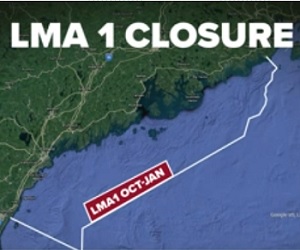
Last ditch effort? MLU gets legislative backing for court fight over Right Whale closure
In some of Maine’s biggest lobster harbors such as Stonington and Deer Isle, the closure of nearly 1,000 square miles of fishing territory is a big worry. In some of Maine’s biggest lobster harbors such as Stonington and Deer Isle, the closure of nearly 1,000 square miles of fishing territory is a big worry. Virginia Olsen fishes there and is also a leader of the Maine Lobstering Union.,, The lobstering union is going to federal court next Friday, hoping to get a temporary restraining order to stop the closure.,,, In advance of that hearing, the Maine Legislature is getting involved. >Video, click to read< 13:35
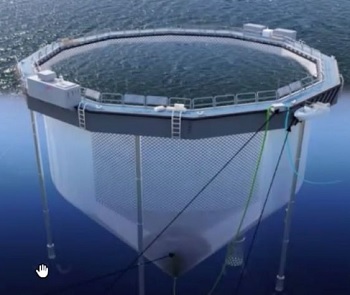
If the Frenchman Bay salmon farm isn’t right for Norway, it’s not right for Maine
About that American Aquafarms proposal: NIMBY- not in my backyard. In this case it applies to the developer, not the opponents. Whenever I describe to people the location of this industrial development in Frenchman Bay, their first reaction is always the same: What were they thinking? How could they possibly do this? The short answer is, the developers came here to do what they couldn’t do back home in Norway. They couldn’t build this project in their own backyard, so they are trying to put it in our front yard,, We’re better than this, and it’s time we stand up for all that is special about the Maine coast and say no. Not here. Not now. Not ever. >click to read< By Jerry Potter 10:55

Challenges abound, but lobstermen say they’re in it for the long haul
Around 2 a.m. each morning, a parade of trucks from around the region begins the journey down to the Stonington docks, marking the start of another day of lobstering in Maine. In short, a large part of coastal Hancock County and beyond depend on lobster. One of the locals that has made her living off lobster is Julie Eaton, a member of Stonington’s 300-plus lobster boat fleet. She’s been at it for 39 years now and to her it’s not just a job, it’s a way of life. Every fisherman has their own story, but almost all of them say they got into the business because they love working on the ocean. 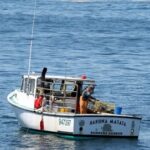 For the hundreds of lobstermen in the region, things are going pretty well at the moment, even with the pandemic. While things are going well, if you talk to almost any Downeast lobstermen about the future of their industry, the conversation will come to two things: right whales and wind turbines. >click to read< 13:28
For the hundreds of lobstermen in the region, things are going pretty well at the moment, even with the pandemic. While things are going well, if you talk to almost any Downeast lobstermen about the future of their industry, the conversation will come to two things: right whales and wind turbines. >click to read< 13:28






